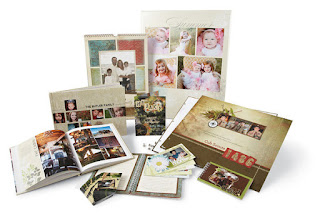Today we'll bust the last of the four memory-keeping myths I often hear. (If you hear others, post them in the
comments below because I'd love to BUST them!) Today's myth is a
less-common one, but an important one to bust. This one is about writing!
Myth
#4
When I encourage people to preserve their photos
and memories, I sometimes hear this myth: "I'm not good at
writing. I can't write out my memories and stories because I don't know
what to say."
Sometimes people even tell me they prefer
just having albums with photos but no words. Unfortunately, it just
doesn't work that way.
And by "it doesn't work,"
I mean: IT DOESN'T WORK.
Let me tell you what I mean.
If you don't write anything to go
along with your photos, they're (quite honestly) meaningless. A photo without
some sort of notation--the reason you took the photo, the names and places and
dates and memories--loses its value, especially over time.
Here's why this myth has to be busted!
My mother knew who these sweet folks
are. One of them died before I was born, and I met the other one once
when I was maybe 2 years old. If she hadn't put names and dates on
this photo, I would be looking at this photo the way YOU are right now:
I'd be looking at strangers. The fact that my mom wrote down some of
her memories about these people makes this a very meaningful photo to me.
Writing something is vital.
I have a lot more pictures about
people I DO know--grandparents, siblings, parents, children, and even
friends. I have pictures of first days of school and birthday parties and
vacations and lost teeth. However, if I don't write what I know about
those pictures, what I remember of the details will not only become lost to my
children but will eventually become lost to me over time, simply because--as
human beings--we forget.
“A life that is not documented is a life that within a generation or two will largely be lost to memory. What a tragedy this can be in the history of a family. Knowledge of our ancestors shapes us and instills within us values that give direction and meaning to our lives. ... Bridges built between generations are not built by accident. If I want my children and grandchildren to know those who still live in my memory, then I must build the bridge between them. I alone am the link to the generations that stand on either side of me.” ~{Dennis B. Neuenschwander}
And, to do this, you have to write.
The older I get, the more adamant I
become about gifts, talents, and individuality. God put you on this earth
to be yourself. If you are gifted at writing, that's fantastic, but
the memories of people who are not as gifted at writing are equally as valuable
as the memories of people who are. EVERY person needs to record
his/her story. Every one. No one else can be you.
Writing down your experiences,
stories, and memories does not require a special degree or training. Your
memories are yours. End of story.
If you struggle with writing, here are two ways to overcome the idea that you "can't" write:
- I'd like you to think of an exciting or happy or
wonderful thing that happened recently. Think about what you would
say if a friend called you and said, "So, how did it go? What
did you do? Who were you with? What was the thing you liked
the most? What made it memorable?" What you would SAY
is what you would WRITE next to those photos in an album. You
don't have to fill a page. You don't have to fill a paragraph.
In some cases, writing the story of your photos isn't very long.
"Bob's second time on the biggest roller coaster at Hershey Park,
7/7/2014. He would have gone more if we had time," is all
that's needed.
- Write to the future. If your grandchild were looking through this album,
would he/she know what happened, what makes these photos meaningful, and
what links him/her to you? He or she will be looking for things that
he/she has in common with you. So write! Show yourself in this
record you're creating.
Tell your story your way! Memory-keeping doesn't require
anything fancy, anything hard, or anything complicated. But it does
require your story. Tell your story using your own words.
That's what people who see your memory albums want! They want your story
in your voice. If you would say, "It was super cool,"
then write "It was super cool." Be true to
yourself.
Don't over-analyze what you write. Even grammatical
errors and misspellings are actually true to you. (This, by the way,
is coming from a Type A English Literature major who is the daughter of two
English majors and writers. So trust me on this.) Long
paragraphs or short details are true to you. Use your voice. Show
who you are. Wit, wisdom, and favorite quotes show the readers YOU.
And that's exactly what they're
looking for.
 |
| Share this post by saving it to social media. |
This post
was first published on April 28, 2017, at www.livegrowgive.org by
Jennifer Wise.
More #familyhistoryfriday posts can be found by clicking the hashtag in the Labels below.



























